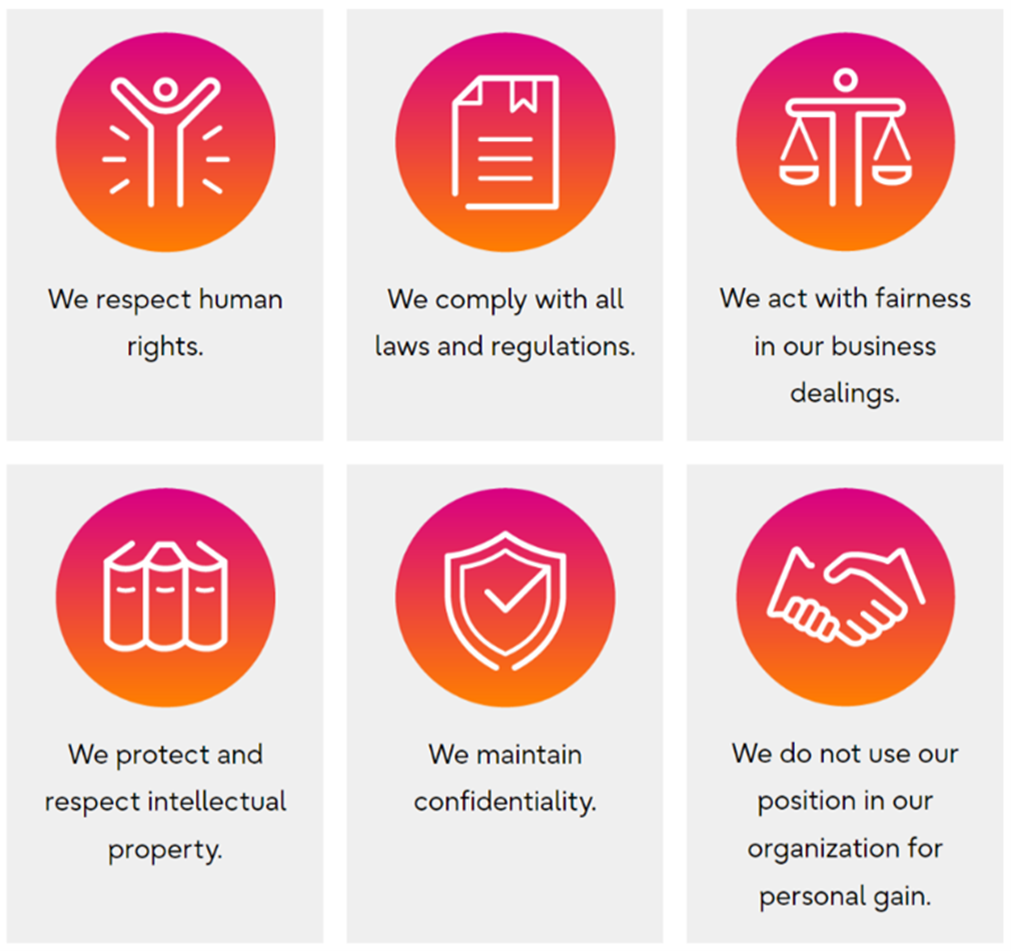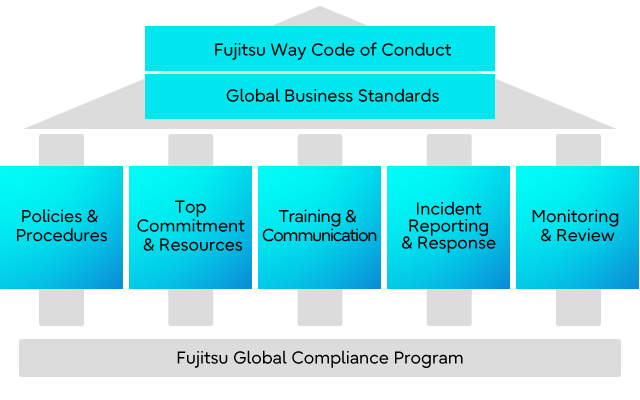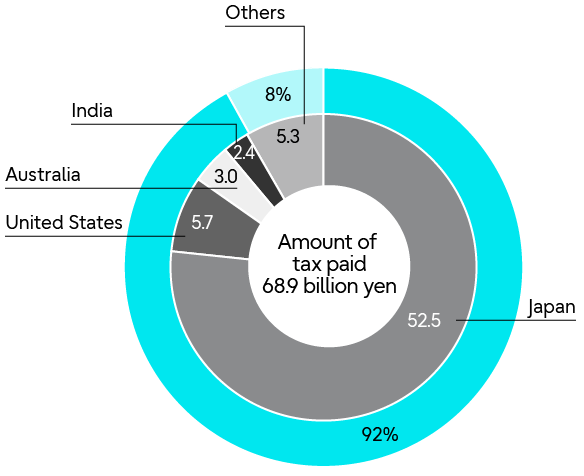-
Sustainability at Fujitsu Group
- Sustainability Management in the Fujitsu Group
- GRB(Global Responsible Business)Goals for FY2025
- GRB(Global Responsible Business)Goals and Achievments for FY2022
- Fujitsu's accessibility
- Stakeholder Engagement
- United Nations Global Compact
- SDG-related Activities in Fujitsu
- External Recognition and Awards
-
Global Responsible Business
- Environment
-
- Environmental Management
- The Fujitsu Group Environmental Vision on Climate Change
- Living in Harmony with Nature (Conservation of Biodiversity)
- Environmental Action Plan
- Environmental Data
- Environmental Communication
- Environmental Social Activities
- Disposal and Recycling of ICT products
- Environmental Considerations in ICT Products
- Governance
-
Data and Documents
- Fujitsu Group Sustainability Data Book 2024
- Social, Governance and Environmental data
- Independent Assurance Report

- GRI Standards / United Nations Global Compact (UNGC) principles Comparison Table
- SASB Standards Comparison Table
- Sustainability Information Disclosure Framework
- Link to regions responsible business reports
- Contact
- Sitemap
Compliance
WHAT FUJITSU ASPIRES TO BE
Ensure that all officers and employees within the Fujitsu Group conduct their business activities with a high level of compliance awareness, and through those activities the Fujitsu Group becomes a trusted corporate group that is chosen by stakeholders for investment, business transactions, and employment and that fulfills its role as a model for society.
GOALS FOR FY2025
To ensure that the entire organization is familiar with compliance-related parts of the Fujitsu Way Code of Conduct, the Global Compliance Program will be implemented throughout the Group to instill a high level of awareness toward compliance. The management team will take the lead in fostering a corporate culture where no employee tolerates any kind of misconduct (Zero Tolerance). We will also expand these activities to all parties doing business with Fujitsu, seeking their understanding.
- Send out annual messages on the importance of compliance from management in Fujitsu's head office, including the CEO, and from the heads of Group companies in each country
- Provide compliance training to more than 100 business partners each year
- Prevent bribery and cartels from occurring
Policies and Structure for Implementation
The Fujitsu Group has a compliance division under the General Counsel and carry out measures based on the Global Compliance Program in cooperation with compliance offices in each region. In addition to fostering a corporate culture that each employee does not tolerate any wrongdoing, the Group is also implementing activities to promote a high level of compliance among all stakeholders in Fujitsu’s business, including business partners. The results of these activities are reported to the Risk Compliance Committee, which was established based on “Policy on the Internal Control System” (*1), and raising awareness and ensuring of the Fujitsu Way Code of Conduct in Fujitsu Group are implemented in cooperation with the Board of Directors and Audit & Supervisory Board Members.
In each region, raising awareness and ensuring of the Fujitsu Way Code of Conduct are implemented in cooperation with the Region Risk Compliance Committee established as a subcommittee of the Risk Compliance Committee.
The operational status of the Global Compliance Program is regularly reported to the Risk Compliance Committee, the Region Risk Compliance Committee, and the Board of Directors. The development and operation of internal rules, education, and monitoring systems to comply with various laws and regulations related with Fujitsu Group’s business are promoted under the practice and supervision of management.
- (*1)
Fujitsu Way Code of Conduct
 Fujitsu Way Code of Conduct
Fujitsu Way Code of Conduct
The Fujitsu Way contains a Code of Conduct, which outlines the fundamental principles that all Fujitsu Group employees should abide by, as shown on the right.
Fujitsu has also implemented the Global Business Standards (GBS) (*2) in 14 languages and it applies uniformly across the Fujitsu Group. It defines and elaborates on the principles of Fujitsu’s Code of Conduct to help executives and employees understand and apply the Code of Conduct in their actions.
- (*2)
Our employee evaluation criteria include assessing the level of an employee’s embodiment of “Our Values” under the Fujitsu Way. One of the values is for employees to act with ethics, transparency and integrity. As such, employee personnel assessment and compensation reflect their level of compliance with the Code of Conduct.
Global Compliance Program
Fujitsu has developed the Fujitsu Global Compliance Programdisseminate the Fujitsu Way Code of Conduct and the GBS, and is working to maintain and improve the Fujitsu Group’s global legal compliance structure. The Global Compliance Program organizes our various compliance-related activities into five pillars in a systematic manner. The Global Compliance Program promotes external understanding of Fujitsu’s compliance structure and its compliance activities, in addition to clarifying what items Fujitsu needs to address on a continual basis. Based on this Global Compliance Program, we implement various policies and initiatives in each region, taking into account factors such as each country/region’s legal systems and government institutions guidelines.
When implementing the Global Compliance Program, we establish internal Group rules and assign a compliance officer in each region to be responsible for compliance activities and ensure the structure’s implementation. We also continuously provide employees with various forms of training, with the goal of embedding the Fujitsu Way Code of Conduct and the GBS. In addition, we have established an internal whistleblower system in the event of compliance issues, and employees are required to immediately report compliance violations to the Risk Management & Compliance Division if they are discovered. We periodically verify the effectiveness of the Global Compliance Program through measures such as risk assessment, audit, and reviews by external specialists, and continuously work towards improving the Global Compliance Program.

Global Compliance Program
1. Establishing Policies and Procedures
Fujitsu Group's minimum requirements for internal rules that must be established by Fujitsu Group companies have been put together as the Fujitsu Group Global Policy. This policy establishes norms, rules, etc., after taking each country’s law, culture, customs and other characteristics into account.
We have instituted the Rules for Compliance with the approval of the Risk Management & Compliance Committee, and expanded the Rules for Compliance into Japanese Group companies with the aim of thoroughly ensuring compliance and sustainably improving corporate value. In particular, under the above rule, we have established more specific, detailed rules and guidelines in the areas with significant impact on business; namely, antitrust law, anti-bribery, and antisocial forces.
For non-Japanese Group companies, in addition to the Fujitsu Group Global Policy, we have formulated global guidelines based on the approval of the Risk Management & Compliance Committee, and have had these guidelines adopted into the internal rules of each non-Japanese Group company. In addition to issuing General Compliance Guidelines which correspond to the above Rules for Compliance, we have also issued global guidelines which relate to competition laws and various guidelines which pertain to bribery prevention.
With regard to bribery and conflict of interest, in addition to principles defined in the GBS, we have established various internal rules that state the advance application and approval processes required for actions such as providing gifts and hospitality to government officials , receiving gifts and entertainment from business partners by our employees, giving donations, sponsorships and charitable contributions to various organizations, including political organizations, and facilitating payments. We also conduct compliance checks of organizations that receive donations and sponsorships. Furthermore, as one measure for conducting advance surveys and evaluation of transaction risk in regions and fields that are at a high risk for corruption, we perform due diligence at the time of starting new transactions. We screen our suppliers through steps such as requiring suppliers to complete questionnaires according to their risk level. We also require partners to abide by laws and regulations through contracts and other means.
2. Top-Level Commitment and Securing of Resources
Top management expresses its intentions to strive for compliance proactively and continuously through measures such as sending messages to employees. In doing so, Fujitsu puts the Code of Conduct and the GBS into practice and spread them throughout the entire Fujitsu Group.
The President himself has repeatedly sent out messages to all employees, both in Japan and overseas, declaring that Fujitsu will put an end to compliance violations such as collusion and the formation of cartels. Even overseas, regional heads and Group company top managers continuously send out messages emphasizing the importance of compliance and a corporate culture that has zero tolerance for wrongdoing.
Furthermore, Fujitsu established the annual Fujitsu Compliance Week which begins on December 9th runs until December 15th, to coincide with "International Anti-Corruption Day"(December 9th). During that week, compliance messages are simultaneously sent to employees by top management (including the CEO) at Fujitsu headquarters and the Heads of each business region, and Presidents of group companies in each country. We also release annually updated Compliance e-Learning to employees of all Group companies, and provide compliance-related activities planned for each region.
Additionally, we have assigned staff in charge of compliance operations in each region, and have formed a global network composed of staff in charge of risk compliance at each Fujitsu Group company. Based on these steps, we have established a system for operation of our Global Compliance Program. In FY2023, officers responsible for compliance in each region visited Japan for a discussion on a future global compliance policy.
3. Training and Communication
The Fujitsu Group continuously conducts various training and communication opportunities for executives and employees in order to embed and implement the Fujitsu Way Code of Conduct, the Global Business Standards, and other internal rules.
We provide Compliance e-Learning for all Fujitsu Group executives and employees every year. The contents of this e-learning includes risk areas such as bribery, collusion, fraudulent accounting, and security export control. Moreover, in order to reflect the results of risk assessment and social conditions, the Compliance Division at Fujitsu headquarters and compliance staff from each region conduct an annual review of the e-learning. In FY2023, compliance e-learning was conducted in 14 languages for all Fujitsu Group executives and employees (approximately 120,000 people). As of April 2024, 97% of all executives and employees have already taken the course.
In addition to the measures listed above, we conduct timely online training and e-learning in accordance with the risk level of each organizational level, region, and division. The training and e-learning is based on laws, customs, and actual business conditions in each country. Every year, Fujitsu and domestic Group companies hold compliance training sessions targeted at newly appointed executives. This training is conducted by lawyers from outside Fujitsu, and the company's legal and compliance divisions. For managers, we periodically conduct internal training where in-house instructors explain the importance of the Code of Conduct and compliance, in addition to discussing typical scenarios and difficult situations. We have also implemented compliance education as part of training for new employees. In addition to ensuring that new employees understand the importance of the Fujitsu Way Code of Conduct and the Global Business Standards, we continually provide education that focuses on specific risks in organizations such as sales divisions and legal division. In FY2023, we conducted compliance training for approximately 211 partner companies.
As mentioned above, Fujitsu has designated an annual Fujitsu Compliance Week, during which the CEO and regional heads send out a message to employees and distribute compliance-related news.
In addition to these top-down activities, we collect ideas and strategies from employees on how to avoid compliance violations through surveys. The valuable insights gathered from these surveys are then published on the company intranet, providing an opportunity for employees to learn from each other.
4. Reporting and Responding to Incidents
Establishing an Internal Whistleblower System
The Fujitsu Group has established an internally and externally accessible portal, operated as Fujitsu Alert, to receive internal whistleblower reports and consultation (including anonymous reports) from all Group employees (including board members, retirees, temporary transfers, contracted employees, part-time employees, dispatch workers, and others) and offer consultations. Group companies also maintain and operate separate internal whistleblower systems.
Through a web form or telephone hotline, Fujitsu Alert accepts reports on suspected wrongdoing or concern from all Fujitsu Group employees and external parties relevant to the Fujitsu Group, including customers and suppliers (anonymously, if applicable). Fujitsu Alert is available in 14 languages 24 hours a day, 365 days a year. Fujitsu Alert also serves as reporting system for business partners from which the Fujitsu Group (companies in which Fujitsu has direct or indirect investment of more than 50%) directly procures goods, software or services.
Fujitsu Alert is publicized to employees via periodic messages, compliance training sessions, websites, and posters. In addition, Fujitsu periodically confirms trends in the usage of Fujitsu Alert in order to ensure increased recognition for and confidence in the systems among employees.
Protection of Whistleblower
Employees are encouraged to report breaches or potential breaches of compliance of which they become aware. Furthermore, if employees are unsure of the appropriate action to be taken, they can seek advice from a supervisor in their division or a specialized division such as the legal division.
Anonymous reports can be submitted to Fujitsu Alert, and we handle information with the utmost care in order to preserve anonymity. Even in cases where the whistleblower is indirectly identified during investigation process, we strictly prohibit the adverse treatment of whistleblowers due to their reports, and any such adverse treatment will be regarded as an extremely serious breach of internal policies.
Response to Reports
When a breach of compliance is reported on Fujitsu Alert, we will conduct an internal investigation under the supervision of responsible managers who are licensed attorneys, and will cooperate with external attorneys when necessary. Fujitsu directly reports the results of its internal investigations to the Board of Directors and the Risk Management & Compliance Committee. These reports are made independent of the division and/or affiliated companies which are involved in the subject matter under investigation. Depending on the content of the report, the Compliance Division may delegate an investigation to other authorized divisions if deemed appropriate.
The Compliance Division will conduct an appropriate internal investigation in order to understand the facts and review possible countermeasures in accordance with applicable laws and professional standards. The internal investigation includes, but is not limited to, consideration of applicable laws, consideration of appropriate investigation steps, evaluation of collected evidence, documentation of investigation results, and reporting or escalation. Depending on the results of the investigation, Fujitsu provides feedback to the whistleblower if necessary based on applicable laws such as the data protection laws and business laws.
In the event that the investigation has verified problems according to the Code of Conduct, Global Business Standards, or other internal rules, we take corrective measures such as disciplinary action and reflect the results in personnel evaluations. In order to prevent similar problems from occurring in the future, we remind all parties of rules, revise systems, strengthen monitoring and supervision, and take other necessary measures.
The process for these investigations, etc., is also reviewed and improved at least once a year, including at the time of establishment of the annual plan under the Global Compliance Program and/or at the time of enactment or amendment of relevant laws.
Fujitsu may be either required by law or decide based on business judgement to provide information about compliance violations to certain government and/or judicial agencies (including, but not limited to, government investigative agencies or courts). When making such decisions, Compliance Division staff work together with managers and other relevant divisions as necessary.
Moreover, letters or emails received via platforms other than Fujitsu Alert are also reviewed for investigation of suspected compliance breach and corrective measures and response are taken as needed.
Total of Reports to Fujitsu Alert and Breakdown
In FY2023, 143 reports were submitted to Fujitsu Alert. Of these, there were no confirmed cases of corruption (bribery included) or legal disputes. The Fujitsu Group takes measures to prevent corruption based on the GBS(*3) , the Standard Policy for Compliance, and each company's internal regulations.
| FY2023 | ||||
|---|---|---|---|---|
| Case reported | ||||
| Number of actions taken | ||||
| Total number of cases | 143 | 7 | ||
| Human rights violations (harassment, discrimination, etc.) | 37 | 3 | ||
| Violation of laws or internal rules | 10 | 3 | ||
| No violations(*4) | 27 | - | ||
| Violation of Competition Act (bid rigging, cartels, etc.) | 4 | 0 | ||
| Violation of laws or internal rules | 1 | 0 | ||
| No violations | 3 | - | ||
| Bribery | 2 | 0 | ||
| Violation of laws or internal rules | 0 | |||
| No violations | 2 | - | ||
| Violation of conflicts of interest policy | 17 | 1 | ||
| Violation of laws or internal rules | 3 | 3 | ||
| No violations | 14 | - | ||
| Violation of the company’s or customers’ confidential information or personal information protection | 5 | 0 | ||
| Violation of laws or internal rules | 1 | 0 | ||
| No violations | 4 | - | ||
| Insider trading, money laundering | 0 | 0 | ||
| Violation of laws or internal rules | 0 | 0 | ||
| No violations | 0 | - | ||
| Other | 78 | 3 | ||
| Violation of laws or internal rules | 9 | 3 | ||
| No violations | 69 | - | ||
- (*3)
- (*4)"No violations" in the chart includes cases under investigation as of the end of the fiscal year
Filing Reports with the Risk Management & Compliance Committee
When executives or employees become aware that compliance violations have occurred, or recognize signs that violations may occur, they are required by the risk management regulations to immediately file a report with the Risk Management & Compliance Committee and in accordance with the reporting system previously established by the head of the division. In addition, we periodically report to the Risk Management & Compliance Committee, the Board of Directors and Audit & Supervisory Board members concerning internal whistleblower reports and consultations, as well as our responses to major compliance issues. Please refer to the Fujitsu Group Integrated Report for the number of meetings of the Risk Management & Compliance Committee and the Board of Directors.
5. Monitoring and Reassessment
The Fujitsu Group conducts annual verification of the effectiveness of the Global Compliance Program through reviews of our risk assessment and internal auditing activities, and through reviews by external experts such as law firms. We are also working to continuously improve our Global Compliance Program based on the results of applicable reviews and audits, as well relevant social conditions. Please refer to the Risk Management page regarding our risk assessment activities.
The Compliance Division of Fujitsu headquarters continually assesses risk that mainly targets Group companies located in overseas countries and regions with a high risk of corruption. Through interviews with executives/employees and verification of internal rules and business processes, the Compliance Division analyzes the compliance risks of local businesses. It then proposes countermeasures in accordance with the actual contents and extent of risks, and supports the implementation of those countermeasures.
The status of risk assessment and implementation of the Global Compliance Program are periodically reported to the Risk Management & Compliance Committee, the Regional Risk Management & Compliance Committees, and the Board of Directors. The discussions and decisions made at these meetings are reflected and implemented in a timely manner to activities in the Global Compliance Program.
Initiatives for Security Export Controls
From the viewpoint of maintaining global peace and security, the export of goods and the transfer of technology that could be used for the development or production of weapons of mass destruction or conventional weaponry are controlled by an international framework for security export controls. In Japan, by following its framework, the regulations for security export controls are implemented under the Foreign Exchange and Foreign Trade Act (the Foreign Exchange Act).
In line with one of the Fujitsu Way Code of Conduct, “We comply with all laws and regulations,” Fujitsu has enacted “Security Export Control Regulations” internally and thoroughly enforced it as the fundamental policy to promote security export controls in accordance not only with the Foreign Exchange Act, but with the Export Administration Regulations (EAR) of the United States, which is applied extraterritorially.
As Fujitsu's management system, the President serves as the Security Export Control Chief Officer, while the Security Export Control Office in the Corporate Governance and Compliance Unit serves as the organizer of the security export control operations. On the operational process, it is required that, before export of goods and the transfer of technology to overseas, all classification and transaction screening (scrutinizing destination country/region, end-use/end-user) are surely executed and then all necessary licenses are adequately obtained. “Security Export Control Regulations” also sets the rule that legal violations shall be reported immediately. When execution of business, to prevent legal violations by misinterpretation and/or overlook of related regulations, Fujitsu closely aligns with the Ministry of Economy, Trade and Industry which has jurisdiction over export administration regulations.
Due to such internal system for security export controls upheld, the regular audit is conducted, as well as the export controls training is provided to all executives and employees.
For domestic and overseas Group companies, the guidance about rules and frameworks for proper security export controls is offered accordingly, and any related activities like educational support, audit support and event with the Group for information exchange are given as well. Furthermore, since FY 2013, e-Learning course about basic security export controls has been developed, which is available in multiple languages for Fujitsu Group companies worldwide.
System to Ensure Proper Financial Reporting
In the “Policy on the Internal Control System”, which was resolved by the Board of Directors, Fujitsu stipulates the following points.
- The Company has, apart from the organization that prepares financial reports, an organization under the Chief Financial Officer responsible for establishing, operating, and evaluating internal control over Fujitsu Group financial reporting, to ensure the effectiveness and reliability of financial reports.
- These organizations create rules for establishing, operating, and evaluating internal control over the unified accounting policies shared throughout the Fujitsu Group and financial reporting.
- The organization responsible for establishing, operating, and evaluating internal control over financial reporting periodically reports to the Board of Directors and any other relevant person or organization the results of evaluations on the effectiveness of the internal control.
Status of operations
The organization responsible for internal control and internal audits has established the system and assesses internal control over financial reporting throughout the Fujitsu Group, and reports the activity status and assessment results to the Representative Director and CEO, Chief Financial Officer, Audit & Supervisory Board Members and the Board of Directors in accordance with the principles of the “Practice Standards for Management Assessment and Audit concerning Internal Control Over Financial Reporting” published by the Business Accounting Council.
Our Approach to Tax Matters
Tax Compliance
Tax compliance at the Fujitsu Group is carried out according to the Fujitsu Way Code of Conduct.
We understand the purpose and essence of each country’s tax laws and treaties, as well as other guidelines such as those laid out in the Business Erosion and Profit Shifting (BEPS) Project led by the OECD, and abide by them. We strive to file tax returns and pay taxes appropriately. In transactions between related companies, we will comply with the general rule of an arm’s length price and distribute profits appropriately.
Tax Governance
The Director who serves as the Chief Financial Officer is responsible for the proper filing and fulfilment of tax returns and obligations, management of tax risks, and optimization of tax expenses. Important matters and risks related to tax are reported to the management meeting and Board of Directors in a timely and appropriate manner for approval.
Transfer Pricing
We comply with the principle of arm's length pricing and distribute profits appropriately when conducting transactions between affiliated companies. We do not transfer business profits generated in countries/regions to countries/regions with low tax rates where we do not conduct business transactions.
Tax Planning
We do not engage in tax planning that is solely for the purpose of avoiding taxes without business purpose or business substance. Similarly, we will not use tax havens to transfer profits with the intention of avoiding taxes.
Relation with Tax Authorities
We strive to build a sound relationship with the tax authority in each country by conducting our business with ethics, transparency, and integrity in accordance with Our Values under the Fujitsu Way.
Based on the above, we aim to achieve proper tax management, in order to continuously improve corporate value.
Tax Information
Tax amount by region (FY2022)
(billion yen)
| Domestic | Overseas (*6) | Total | |||||
|---|---|---|---|---|---|---|---|
| Europe | Americas | Asia Pacific | East Asia | ||||
| Amount of tax paid (*5) | 52.5 | 16.4 | 2.4 | 6.2 | 6.7 | 1.1 | 68.9 |
- *5:Figures are based on the Country-by-Country Report submitted to the Japanese tax authority, and not directly related to consolidated financial statements.
- *6:Europe includes the Middle East and Africa. East Asia represents the sum of China, Taiwan, and Korea, while Asia Pacific includes other Asian countries and Oceania.
 Tax amount by country
Tax amount by country
Company name and main business (as of the end of March 2023)
| Company Name | Main Business | |
|---|---|---|
| Japan | Fujitsu Ltd.
Fujitsu Japan Limited Fujitsu Fsas Inc. Fujitsu Telecom Networks Limited Fujitsu Frontech Limited Fujitsu Network Solutions Limited Transtron Inc. Ridgelinez Limited Fujitsu Personal System Limited Shinko Electric Industries Co., Ltd. FDK Corporation etc. |
|
| Europe | Fujitsu Technology Solutions (Holding) B.V.
Fujitsu Technology Solutions GmbH Fujitsu Services Holdings PLC Fujitsu Services Limited Fujitsu Finland Oy etc. |
|
| Americas | Fujitsu Network Communications, Inc.
Fujitsu America, Inc Fujitsu North America, Inc. Fujitsu Consulting (Canada) Inc. SHINKO ELECTRIC AMERICA, INC. etc. |
|
| Asia Pacific | Fujitsu Australia Limited
FUJITSU ASIA PTE. LTD. Fujitsu Consulting India Private Limited Fujitsu New Zealand Limited Fujitsu Thailand Co. Ltd. etc. |
|
| East Asia | Fujitsu Korea Ltd.
FUCHI ELECTRONICS CO., LTD Fujitsu (China) Holdings Co.,Ltd. FUJITSU (XI'AN) SYSTEM ENGINEERING CO.,LTD. Beijing Fujitsu System Engineering Co., LTD. etc. |
|
FY2023 Performance
Message from Management
- As part of Fujitsu Compliance Week, which coincides with International Anti-Corruption Day, the President, regional heads, and other senior executives sent out messages to employees about ensuring compliance
Compliance Training
- Compliance e-Learning for all officers and employees at the Fujitsu Group (Conducted in 14 languages for approximately 120,000 people): 97% of executives/employees have taken the course as of April 2024.
- Other e-Learning and on-demand training for different regions, companies, positions and/or functions(For example, training conducted for newly appointed executives, managers and overseas assignees, newly hired employees or sales employees).
- Conducted training on fair trade for approximately 211 partner companies
Bribery/Cartels
- No confirmed cases.
Security Export Controls
- Regular internal audits: 84 divisions within Fujitsu
- Seminars for employees responsible for export controls at Group companies: 25 domestic Group companies
- Audits, training and structural enhancement and support: 13 domestic Group companies and 37 overseas Group companies


